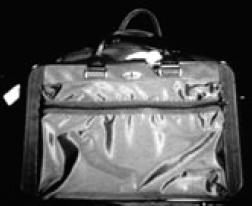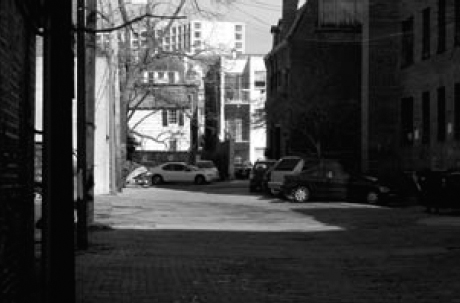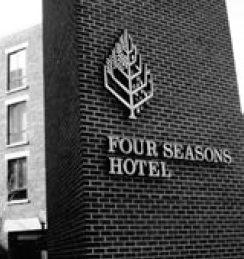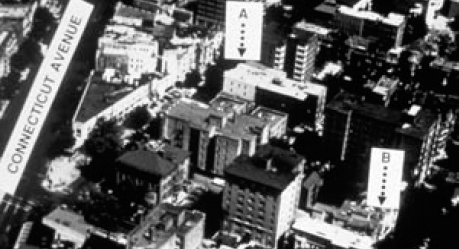![]()
When she hung up the phone, Anne’s head was spinning. Cactus? Wedding album? She and Jay had only just worked out the code words. Was there something her husband knew that he hadn’t told her? Was the FBI onto them? Whatever the answer, Jay was in trouble. Anne had been getting ready to go out for dinner. Aviem Sella, Pollard’s original Israeli handler, and his wife happened to be in Washington, and they were supposed to meet the Pollards for dinner.1 Chucking those plans, she hauled the nylon-cloth suitcase out of storage, one of several Jay used to make deliveries to the Israelis, and frantically began stuffing it with classified documents. There were so many! She had to make sure she got every single page. She couldn’t forget the classified documents on China she had been working on.

Small nylon suitcase containing classified documents —NIS EVIDENCE PHOTO
Working against the clock, not knowing how much time she had left, she clapped the suitcase shut and dragged it to the front door of their apartment. Her plan, devised without the luxury of forethought, was to throw the suitcase in a dumpster located in the alley behind their apartment building. That was easier said than done. The suitcase weighed about seventy pounds, and Anne, in addition to being petite, was out of shape, her girth having spread from their month after month of fine dining.
With much huffing and puffing, and now feeling sick to her stomach, she dragged the suitcase down three flights and out the rear entrance of the apartment building. The dumpster was on the other side of the alley. Glancing to her right and left before crossing over, she spotted a car at the end of the passageway. Her heart almost stopped beating. It had black-wall tires and two antennas on the trunk, the engine was running, and she could hear the dry, scratchy sounds of radio static. Two men sat in the front seat. The scene matched everything Jay had told her about government agents and their unmarked cars. They had to be FBI. She and Jay were under surveillance!

Alley behind the Pollards’ apartment —RON OLIVE
The evidence in the suitcase had to be destroyed, but how? Certainly she couldn’t take it back up to her apartment. For all she knew, the FBI would come knocking on her door at any time. Besides, the suitcase was too cumbersome to drag back up the stairs. No, it would have to be moved elsewhere. At her wit’s end, Anne decided that the only course of action was to approach the neighbors. Surely her need for help could be explained in a manner that would not arouse their suspicion. And so she lugged the suitcase back into the building and across the floor, placing it under the first-floor stairwell.
She then hurried upstairs and knocked on her neighbors’ door. Christine Esfandiari—the woman with whom Pollard had told his interviewers at the NIS he and Anne would be dining that evening—poked her head out and beheld a very distraught-looking woman. Ms. Esfandiari asked Anne to come in but she refused, launching into a frantic, breathless explanation of how her husband was in big trouble and she needed help removing a heavy suitcase from the building. When Ms. Esfandiari questioned her about the suitcase, Anne said that she had asked Jay to help her out with some information on the Chinese embassy and that the suitcase contained classified documents.2 They were going to burn them but never got around to it, she added. Please, could Christine help her?
By now the husband, Babak Esfandiari, an Iranian studying in the United States, had come to the door. Eventually, he agreed to help out. Anne asked him to retrieve the suitcase from under the first-floor stairwell and transport it to the Four Seasons Hotel in Georgetown. She would meet him there in the lobby, take the suitcase, and somehow destroy the documents.3

Four Seasons Hotel —RON OLIVE
After slipping Babak ten dollars for the taxi ride, Anne left and walked around the neighborhood for a short while to see if anyone was following her. Thinking the coast was clear, she hailed a cab, but just to be on the safe side, she made the driver take a circuitous route to the hotel. She had him drop her off a block away from the Four Seasons, and then walked in circles in case she was being trailed. In the meantime, Mr. Esfandiari retrieved the suitcase, caught a cab, and went directly to the hotel. He looked for Anne in the lobby, then the bar, thinking she might be having a drink. After waiting for what seemed like a long time, he went outside and took a cab back home, bringing the suitcase with him. Shortly thereafter, Anne arrived and began looking for Babak.
Seeing no sign of him, she started to panic and called the Esfandiari residence to find out if Babak had left his apartment yet. Yes, Christine replied, he should be at the hotel. Frightened, Anne finally called Aviem Sella at the Holiday Inn in Bethesda, Maryland.
O’Donnell’s Seafood restaurant located half a block from the Holiday Inn in Bethesda, Maryland —RON OLIVE
It was around ten o’clock. Sella answered the phone. He was worried, he told Anne, because she and Pollard hadn’t shown up for dinner. Anne said she had to meet right away, alone—it was urgent. They arranged to meet at O’Donnell’s, a restaurant about half a block from the Holiday Inn. There they sat in a private booth and Anne spilled the whole story.
“Are you sure he’s in trouble?” Sella asked.
“Yes! You have to help me.”
Sella seemed unresponsive, so Anne began raising her voice. Presently, Sella told her to wait where she was, he had to make a phone call.4
No doubt Sella’s impassivity was a facade hiding panic inside. The Israelis supposedly believed Anne knew nothing of her husband’s spy activities, but certainly they weren’t that naive. After getting up from the table, Sella made a beeline for the nearest pay phone and put in a call to Yosef Yagur.
When he returned, Sella informed Anne that he couldn’t stay. He asked her if she wanted to leave with him. No, she replied, Jay needed her. Sella gave her Yagur’s phone number and told her to have Pollard call his handler later if he got the chance. Anne was not to worry; everything would be all right. His parting comment was, “You don’t know me; you’ve never met me; you’ve never heard my name.”5 Though confused, Anne nodded in agreement. Sella said he would call her later at the apartment to see if everything was okay, then hastily departed.
Sella had no diplomatic immunity in the United States. If caught, he would go to an American jail. He had to flee the country. Because of the late hour, however, National Airport had no outgoing flights and the rental car agencies were closed. Not wasting time, he contacted the Israeli embassy, and someone there procured him a car. After one more call to Anne, he decided, he and his wife would hightail it to New York and jump on a plane back to Israel.
It was close to midnight. A thousand thoughts raced through Anne’s head. Where, oh where, was Jay? Was he all right? Was he in jail? She was afraid to head back to the apartment but had nowhere else to go. Maybe Jay would be there when she returned. She hoped so, because there was no one else who could help her. In her entire life, Anne Pollard had never felt so alone.
If Anne had known the identity of the person those FBI men in the alleyway behind her apartment building were really looking for, she might have done something different with the bulging suitcase. She might have simply called a cab herself, climbed in with the suitcase, and made off somewhere with the evidence. But that is not what happened. What happened was an extraordinary coincidence, one that would prove to be the linchpin in bringing Jonathan Jay Pollard to justice.
On 1 August 1985, Don Kidwell was the counterintelligence officer in the CIA’s Rome station. While he was reading a debriefing report about a high-ranking KGB officer who was missing the tips on two of his fingers, Kidwell received a phone call from the marine security office.6 Someone wanted to see him. He headed downstairs to a waiting room on the first floor. Right away Kidwell noticed that the tips of his visitor’s two middle fingers were missing. The man introduced himself as Colonel Vitaly Yurchenko, the number-two KGB officer in charge of Soviet spy operations in North America. He wanted to defect.
During Yurchenko’s debriefings, he told intelligence agents about three American spies he knew of who were currently operating for the Soviets. One was Edward Lee Howard, a CIA employee. When this news filtered down to the FBI they immediately put surveillance on Howard at his residence outside of Santa Fe, New Mexico, but it was too late. Howard managed to elude FBI surveillance and flee to Moscow before an arrest.
Another spy—or so Yurchenko thought—was a sailor who went by the name of Thomas E. Hayden, stationed in Naples, Italy. What the KGB defector did not know was that Master Chief Hayden was a double agent whom I had vetted, recruited, and trained with the help of Special Agents Joe Riccio and Brent Barrett in a counterespionage operation dubbed Sackett Land. Hayden’s mission, launched in 1983, was to portray himself as a traitor willing to sell out his country for money. He had been feeding his Soviet handlers a string of classified information the navy had approved for the operation, and they took the bait.
Operation Sackett Land ended in August 1985 after Yurchenko flew in from Moscow to meet Hayden. Yurchenko drilled the sailor, asking him if he knew any NIS agents who gave briefings on the base. Hayden stood fast in denial, frightened that his cover had been blown. The next day Yurchenko defected. The NIS believed he had been looking for the name of an NIS agent to facilitate his defection. For his service to his country, Hayden would later receive the U.S. Navy Legion of Merit medal.
The third spy Yurchenko named, Ronald Pelton, had been operating within the NSA. Like Pollard, Pelton was an intelligence analyst with a brilliant mind and a photographic memory. He had been passing TS/SCI information to the Soviets, and Yurchenko was his initial contact in Washington, D.C. One of the most damaging pieces of information Pelton disclosed dealt with a sensitive navy operation to gather intelligence on Soviet communications. He would later be convicted and sentenced to three concurrent life sentences.
When Anne went to the alley on the night of Monday, 18 November, to dispose of the suitcase, she saw what she thought were FBI agents on surveillance. She was right about that, but they weren’t watching Anne or her husband. The agents didn’t know the Pollards from Adam and Eve. In fact, they were on the outer perimeter working with other agents who were surveilling the residence of Ronald Pelton’s girlfriend, where the Soviet operative often stayed, which just happened to be in very close proximity to the Pollards’ apartment.
Who would ever have imagined that the fate of the man who would prove to be one of the most notorious spies in the annals of American history would be sealed because the FBI, on a given night, happened to be surveilling another spy? The actions Anne took that night, mistakenly thinking she was being watched, set off a chain of events that enabled the NIS and the FBI to gather evidence against her and her husband that resulted in their expeditious arrest and subsequent prosecution. It was an incredible twist of fate.

Aerial view of Pollard (A) and Pelton (B) apartments —NIS/FBI AERIAL PHOTO
When we arrived at the Pollards’ apartment, it was close to midnight, and Anne was not yet home. The small apartment had a kitchen to the left of the hallway, a combined living room and dining area, and another short hallway that led to the bedroom, an unkempt space with dirty clothes piled several feet high in the closet.
While Farmer, Jechorek, and Redman searched the back bedroom, I stayed in the living room/dining area with Pollard, who wasn’t talking much. He looked bedraggled and was too nervous to sit down. It was late and Anne wasn’t home from dinner yet, which seemed strange. I made a joke about how long she’d been at dinner. “She should be home soon,” he said curtly, without cracking a smile.
Sure enough, some twenty minutes later Anne returned. As far as I knew she was just coming home after dinner with the neighbors. Still, she looked pale and nervous, and I could tell something was wrong because of the way she shuffled over to the couch and sat down with her arms crossed over her stomach, as if in pain. Pollard asked her if she was all right and she said yes.
“We won’t be long,” I assured her. “We’re searching the house and we’ll be done as quickly as possible.” She didn’t say a word to me or her husband, and she studiously avoided my eyes.
While the search was in progress, Pollard’s phone rang and Anne got up and answered it. It was late, and Washington wasn’t the safest city; I figured the neighbors were calling to see if she had made it home safely.
“I can’t talk, Uncle Joe,” she said. “I’ve got unexpected guests. Yes. No, it isn’t.” Then she hung up.7
Pollard didn’t ask who it was and Anne didn’t say a word to him, which struck me as odd. Later, I would find out that Uncle Joe was Aviem Sella.
It took about forty-five minutes for the agents to complete their search. They emerged from the bedroom with approximately thirteen TS/SCI documents and fifty-plus documents classified secret, almost all which had been stashed in a box under the pile of dirty clothes in the closet. Some were found under the bed.8 Most had old dates but were classified nevertheless. The FBI agents asked Pollard why he had all these documents in his house.
“Look, I’m an analyst and I have a lot of work that I can’t always finish at the office,” Pollard said, or words to that effect. “Sometimes I bring my work home with me. I just forgot about these.”
As I scanned through the documents, either Farmer or Jechorek must have called their supervisor, because when I looked back up, they informed me that the FBI was backing out of this case and turning it back over to the NIS. I couldn’t believe my ears.
“What?!” I said.
They went on to say this was obviously an administrative issue and they were letting us handle it, implying that Pollard posed no more of a threat to the United States than an absentminded professor.
I was so mad I couldn’t see straight, but I kept my cool. “Okay, if you say so.” To this day, I have no recollection of how the FBI agents got back to their office. Perhaps Agent Redman drove them. They certainly didn’t catch a ride with me.
Pollard had been scheduled to take an NIS polygraph the next day, Tuesday, regardless of how it turned out with his interview. Before Redman and I departed, I informed him that he had to come into the field office the next morning to take the exam. He gave me a funny look and said okay.
“Be there at ten thirty,” I said, and we left with the documents. We now had both secret and TS/SCI classified documents from Pollard’s apartment, which at a minimum was enough to get him fired by the navy for mishandling classified information, illegal possession of classified national defense information, improperly safeguarding SCI material, and several other charges. Now that the FBI had backed out, however, there was no chance the U.S. attorney’s office would even think about prosecuting Pollard for illegal possession of national defense information. Their hands were full of “real” cases dealing with polished spies, not amateurs. They were gearing up for Pelton’s arrest and were also poised to apprehend Larry Wu Tai Chin, a CIA analyst who had been spying for the Chinese in excess of thirty years and was later convicted on three counts of espionage. Prior to his sentencing date he hung himself in his jail cell.
After returning to the office to secure the classified documents, I drove home in the wee hours to get some desperately needed shut-eye. On the way there I mulled over the events of the past few hours. Assistant Director McCullah was going to hit the roof when he found out what had happened. I winced at the thought of telling him about the documents we’d found at Jay Pollard’s residence, not to mention the FBI’s decision to drop out of the case. In retrospect, McCullah should have been the least of my worries. If I’d known then about the incredible whirlwind of events that was about to whip up, I might have just stayed home.
No sooner had they been left alone than Anne filled Pollard in on what had happened to her. In the mistaken belief that they were still under surveillance, if not by the FBI then at least by the NIS, the couple went to an all-night coffee shop and looked around to make sure no one was watching them. Then, using a pay phone, Jay dialed the number Sella had given Anne. Yagur answered. Was Pollard all right? he wanted to know. Had Israel’s involvement been mentioned or come up in the interview?
No, he wasn’t all right, Pollard replied, and no, Israel had not been mentioned. Yagur told Pollard to stall for at least seventy-two hours, at which point he would get back to him. Then he hung up. Pollard was convinced that a mission was gearing up at that very moment to rescue him and his wife. He couldn’t have been more wrong.